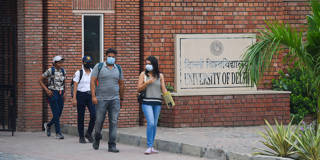MILAN VAISHNAV

The abrupt resignation of an economics professor from a prestigious private university has highlighted concerns about academic freedom in India. The country will never be a “vishwaguru” (teacher to the world), as Prime Minister Narendra Modi often boasts, unless the government stops silencing dissenting voices.
GENEVA – Since enacting the National Education Policy 2020, India has sought to position itself as a twenty-first-century knowledge hub featuring globally competitive institutions of higher education. But the abrupt resignation of a young economist from one of the country’s most prestigious universities, and the subsequent campus revolt over his exit, casts doubt on India’s ability to realize this ambition
In July, Sabyasachi Das, an assistant professor at Ashoka University, released a working paper alleging irregularities in India’s 2019 general election. The study, which has not yet been peer-reviewed, suggested that Prime Minister Narendra Modi’s Bharatiya Janata Party (BJP) won a disproportionate share of closely contested constituencies because of electoral manipulation – namely, the selective culling of Muslims from voter rolls.
To be sure, Das notes that the purported irregularities did not affect the outcome of the vote; the BJP won by a landslide. But given that Modi’s party promotes a strident form of Hindu nationalism and views India’s Muslim minority as electorally irrelevant, the specter of electoral tampering is troubling.
The paper ignited a firestorm. Ashoka, a private liberal arts university located outside New Delhi, sought to distance itself from Das, questioning his research's relevance and integrity. After university authorities subjected him to a gag order and launched a committee of inquiry, Das resigned. The economics department swiftly condemned the move, insisting that Das be unconditionally reinstated. Other university departments chimed in, and students have also voiced their discontent.
For decades, government has applied pressure – often indirectly to facilitate plausible deniability – on academics whose work contradicts official narratives. But since Modi came to power in 2014, that pressure has reached new heights. In 2021, the political scientist Pratap Bhanu Mehta, a vocal critic of Modi’s policies, also resigned from Ashoka, writing that the university’s founders made it “abundantly clear” that his association with the institution was a “political liability.”
Moreover, the pressure on researchers, likely greater in lesser-known schools, extends beyond college campuses, as evidenced by the regulatory assault on the Centre for Policy Research, one of India’s most highly regarded think tanks.
Modi’s government seems to want foreign universities to set up outposts in the country and has invested heavily in select Indian universities designated as “Institutes of Eminence.” Yet the recent controversies suggest that India will not be a vishwaguru (teacher to the world), as Modi often boasts, unless both the government and university leaders credibly commit to uphold intellectual freedom.
India’s academics must be free to explore controversial subjects and to publish politically uncomfortable findings. The university leaders tasked with creating these conditions are in an unenviable position, given the government's leverage over institutions of higher education – a reminder that its regulatory control never disappeared, but merely evolved after liberalization. Private universities with diversified funding sources are not as shielded from political pressure as many believed.
But that should not stop university administrators from broadcasting their unwavering support for faculty, even – or especially – when they take on contentious topics. In a globalized world, talented Indians who feel stifled at home can seek better opportunities abroad. Many have already done so: more than 225,000 Indians renounced their citizenship in 2022, the most in over a decade. The last thing Indian higher education needs is a mass exodus of talent, not least because the country’s best performing university placed 149th in the latest QS World University Rankings.
Government supporters who deride dissenting thinkers as “anti-national” fail to recognize the merits of peer review – a painstaking process through which independent experts weed out subpar research. The controversial findings Das reported in his working paper may wither under scrutiny, but if they pass muster, his data and code will be open for all to scrutinize.
Unfortunately, this case represents the worst of all possible worlds: a promising researcher who felt compelled to leave his job; a prominent university facing a crisis of confidence, as faculty and students push back against administrators; and an abject failure to understand the basic principles of social-science research. As a result, India’s liberal credentials have suffered another serious blow.
Like all societies that aspire to academic excellence, India cannot let ideology – emanating from either the left or the right – guide research, and Indian universities cannot abandon faculty who ask politically provocative questions. Otherwise, students – the human capital that is expected to fuel a “new India” – will become collateral damage, watching helplessly as the government snuffs out the spirit of inquiry.
No comments:
Post a Comment